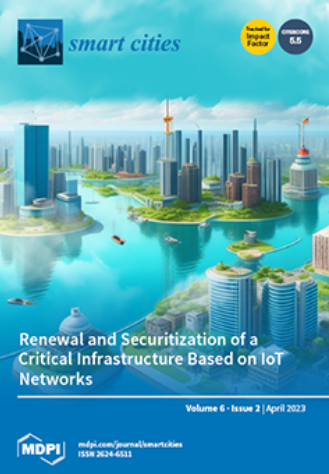Smart Cities—A Structured Literature Review
IF 5.5
Q1 ENGINEERING, ELECTRICAL & ELECTRONIC
引用次数: 14
Abstract
Smart cities are rapidly evolving concept-transforming urban developments in the 21st century. Smart cities use advanced technologies and data analytics to improve the quality of life for their citizens, increase the efficiency of infrastructure and services, and promote sustainable economic growth. Smart cities integrate multiple domains, including transportation, energy, health, education, and governance, to create an interconnected and intelligent urban environment. Our research study methodology was a structured literature review using Web of Science and Google Scholar and ten smart city research questions. The research questions included smart city definitions, advantages, disadvantages, implementation challenges, funding, types of applications, quantitative techniques for analysis, and prioritization metrics. In addition, our study analyzes the implementation of smart city solutions in international contexts and proposes strategies to overcome implementation challenges. The integration of technology and data-driven solutions in smart cities has the potential to revolutionize urban living by providing citizens with personalized and accessible services. However, the implementation also presents challenges, including data privacy concerns, unequal access to technology, and the need for collaboration across private, public, and government sectors. This study provides insights into the current state and future prospects of smart cities and presents an analysis of the challenges and opportunities they present. In addition, we propose a concise definition for smart cities: “Smart cities use digital technologies, communication technologies, and data analytics to create an efficient and effective service environment that improves urban quality of life and promotes sustainability”. Smart cities represent a promising avenue for urban development. As cities continue to grow and face increasingly complex challenges, the integration of advanced technologies and data-driven solutions can help to create more sustainable communities.智慧城市——结构化文献综述
智能城市正在迅速发展,概念正在改变21世纪的城市发展。智能城市利用先进的技术和数据分析来提高公民的生活质量,提高基础设施和服务的效率,促进可持续经济增长。智慧城市融合了交通、能源、健康、教育和治理等多个领域,创造了一个互联智能的城市环境。我们的研究方法是使用Web of Science和Google Scholar以及十个智能城市研究问题进行的结构化文献综述。研究问题包括智能城市的定义、优势、劣势、实施挑战、资金、应用类型、定量分析技术和优先级指标。此外,我们的研究分析了国际背景下智能城市解决方案的实施情况,并提出了克服实施挑战的策略。智能城市中技术和数据驱动解决方案的集成有可能通过为公民提供个性化和无障碍的服务来彻底改变城市生活。然而,实施也带来了挑战,包括数据隐私问题、技术获取不平等以及私营、公共和政府部门之间合作的必要性。这项研究深入了解了智能城市的现状和未来前景,并分析了它们所带来的挑战和机遇。此外,我们对智慧城市提出了一个简洁的定义:“智慧城市利用数字技术、通信技术和数据分析来创造高效的服务环境,提高城市生活质量,促进可持续发展”。智慧城市是城市发展的一条充满希望的途径。随着城市的不断发展和面临越来越复杂的挑战,先进技术和数据驱动解决方案的集成有助于创建更可持续的社区。
本文章由计算机程序翻译,如有差异,请以英文原文为准。
求助全文
约1分钟内获得全文
求助全文
来源期刊

Smart Cities
Multiple-
CiteScore
11.20
自引率
6.20%
发文量
0
审稿时长
11 weeks
期刊介绍:
Smart Cities (ISSN 2624-6511) provides an advanced forum for the dissemination of information on the science and technology of smart cities, publishing reviews, regular research papers (articles) and communications in all areas of research concerning smart cities. Our aim is to encourage scientists to publish their experimental and theoretical results in as much detail as possible, with no restriction on the maximum length of the papers published so that all experimental results can be reproduced.
 求助内容:
求助内容: 应助结果提醒方式:
应助结果提醒方式:


